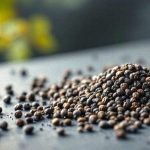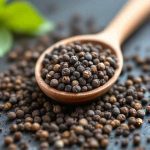Takeaways
- Black pepper contains piperine, which may help reduce appetite
- The spice can enhance nutrient absorption from other foods
- Regular consumption may support digestive health
- Black pepper offers a calorie-free way to add flavor to meals
- Research suggests it could positively impact metabolism
The Spice That Bites Back
Black pepper is a common spice found on most dining tables, adding a distinct flavor to meals.[1] Interestingly, this everyday ingredient might also help manage food cravings.
Black pepper comes from the Piper nigrum plant and has been used for thousands of years.[2] Today, it stands as the most traded spice worldwide, demonstrating its global significance.[3]
Beyond its culinary use, black pepper may have an effect on appetite management. This familiar spice could potentially be a helpful addition to a balanced diet.
A Dash of History
Ancient Roots
The story of black pepper began in South India, where the tropical climate provided ideal conditions for pepper vines.[4] Ancient farmers cultivated these vines along the Malabar Coast.[5]
From its origins, black pepper traveled across the world through trade.[6] Merchants carried it over oceans and continents, making it a highly sought-after commodity on the Silk Road.[7]
Spice Wars
Black pepper played a significant role in shaping global commerce.[8] Due to its high value, it was sometimes referred to as “black gold,”[9] and even led to conflicts over trade routes.
The search for pepper sources also fueled exploration.[10] Many voyages were launched to find new supplies, resulting in the discovery of new trade routes and territories.
More Than Just Flavor
Black pepper contains nutrients and compounds that may have positive effects on health. Let’s examine the components that contribute to this spice’s potential benefits.
| Nutrient | Amount per 1 tsp (2.3g) |
|---|---|
| Calories | 6 |
| Protein | 0.2g |
| Fiber | 0.5g |
| Vitamin K | 3% DV |
| Iron | 1% DV |
| Manganese | 5% DV |
Piperine is a key component of black pepper, responsible for its sharp taste and potential health benefits.[11] This compound is the focus of research into pepper’s effects.
Pepper vs. Cravings: The Showdown
The Science Behind the Spice
The potential for black pepper to help curb cravings stems from piperine.[12] This compound may alter our taste perceptions, which could impact appetite.
Piperine can enhance the intensity of other flavors, potentially leading to a feeling of satisfaction with less food.[13] Some studies suggest it also interacts with hormones related to hunger.[14]
Appetite Control
Black pepper may influence hormones that regulate appetite, possibly increasing feelings of fullness.[15] This could contribute to reduced overall food consumption.
Research indicates that piperine might also boost metabolism.[16] A faster metabolism can assist in weight management by increasing the number of calories the body burns.[17]
Black pepper may help with appetite control in several ways:
- Enhances food flavors, increasing satisfaction
- Possibly affects hunger hormones
- May boost metabolism
- Could increase feelings of fullness
Beyond Cravings: Other Potential Benefits
Digestion Boost
Black pepper may help digestion by stimulating the release of digestive juices.[18] This could help the body break down food more efficiently.
Some research suggests black pepper can support a healthy gut by encouraging the growth of beneficial bacteria.[19] This may contribute to improved overall digestion.
Nutrient Absorption
Black pepper not only adds flavor but also helps the body absorb nutrients from other foods, particularly turmeric.[20]
Piperine can dramatically increase the absorption of curcumin from turmeric, sometimes by as much as 2000%.[21] This is significant because curcumin has anti-inflammatory properties, and black pepper makes it more accessible to the body.
| Foods that pair well with black pepper to enhance nutrient absorption: | Food | Nutrient Enhanced |
|---|---|---|
| Turmeric | Curcumin | |
| Green Tea | Catechins | |
| Beta-carotene rich foods | Beta-carotene | |
| Iron-rich foods | Iron |
Pepper in Practice: Using It Effectively
Dosage and Forms
There isn’t a specific recommended dosage of black pepper for health benefits. However, incorporating it regularly into meals is a good starting point.
You can incorporate black pepper in different ways:
- Whole peppercorns
- Ground pepper
- Black pepper oil
Whole peppercorns retain their flavor longer.[22] Grinding them fresh provides the best taste and potential benefits.
Culinary Applications
It’s easy to add more black pepper to your diet. Here are some creative ideas:
- Sprinkle it on scrambled eggs
- Add it to salad dressings
- Mix it into soups and stews
- Use it in marinades for meat or tofu
- Combine it with other spices for a custom blend
To prepare a simple black pepper seasoning blend:
- Start with 2 tablespoons of ground black pepper
- Add 1 tablespoon each of sea salt and garlic powder
- Mix in 1 teaspoon of onion powder
- Blend well and store in an airtight container
- Use on meats, vegetables, or in sauces
Precautions and Considerations
Possible Side Effects
While black pepper is generally safe, consuming too much could cause some issues. High intakes may lead to:
- Burning sensation in the mouth
- Upset stomach
- Coughing
Those with sensitive digestive systems should be cautious when adding black pepper to their diet.[23] Start with small amounts and observe your body’s response.
Drug Interactions
Black pepper can potentially interact with certain medications, altering how the body processes them.[24] This could influence the effectiveness of these drugs.
Medications that may interact with black pepper:
- Blood thinners
- Diabetes medications
- Drugs metabolized by the liver
It’s advisable to consult with a doctor before significantly increasing your black pepper consumption, particularly if you are taking any medications.
Black Pepper Alternatives
Black pepper is not the only spice that may help manage cravings.[25] Other spices may also offer flavor and potential health advantages.
Some spice alternatives may produce similar effects, such as appetite control or metabolic boosts. However, each has its own unique flavor characteristics.
Spices that may be used as alternatives to black pepper for craving management:
- Cayenne pepper
- Ginger
- Cinnamon
- Cumin
- Cardamom
Each of these spices has its own potential health benefits, allowing for variety in meals while supporting health goals.
FAQ: Pepper Your Knowledge
Let’s address some common questions regarding black pepper and cravings.
Can black pepper help with weight loss?
How much black pepper should I consume daily?
Does black pepper have any negative effects?
Can I use black pepper essential oil for cravings?
Is black pepper addictive?
How does black pepper compare to cayenne for appetite control?
Spicing Up Your Lifestyle
We’ve explored the potential of black pepper to help curb cravings. This common spice provides more than just flavor and could be a useful tool for appetite management.
Remember, black pepper is most effective as part of a healthy lifestyle. It is not a quick fix. Combine it with balanced meals and regular exercise for the best results.
Consider adding more black pepper to your meals. Begin with small amounts and monitor your body’s response. You may notice that it helps you feel full with less food, while also enjoying enhanced flavor.
Black pepper is a spice that has been valued for many years. We are now discovering additional potential benefits. From craving control to enhanced nutrient absorption, it offers a variety of possibilities.
As you explore black pepper’s benefits, pay attention to your body’s responses. Everyone’s reaction to foods and spices is unique. Be patient and consistent in your approach.
Managing cravings is part of overall health. A well-rounded diet, regular exercise, and adequate sleep are essential. Black pepper can be a helpful component of these practices.
Experiment with black pepper in your cooking. Try new recipes or add it to your preferred dishes. You might discover new flavor combinations that you enjoy, making healthy eating more appealing.
If you are taking medications, consult with a doctor before significantly increasing your black pepper intake. They can provide guidance on any potential interactions or concerns.
Enjoy the process of incorporating black pepper into your diet. Cooking with spices can be both enjoyable and rewarding. It is a simple way to add flavor and potential health benefits.
By understanding and using black pepper thoughtfully, you are making a positive step for your health. Small changes can lead to substantial improvements over time. So, give black pepper a try and see if it can enhance your meals and help manage your cravings.
Black pepper is a common culinary ingredient globally, used in a wide variety of dishes for its flavor and aroma.
The Piper nigrum plant is the source of black peppercorns. Its historical usage dates back thousands of years in culinary and medicinal contexts.
Source: “Black pepper and health claims: a comprehensive treatise” https://pubmed.ncbi.nlm.nih.gov/23768180/
Due to high global demand, black pepper is one of the most traded spices, reflecting its importance in international markets.
The Malabar Coast of South India is known for being the origin and ideal growing conditions of Piper nigrum.
Source: “Black pepper and health claims: a comprehensive treatise” https://pubmed.ncbi.nlm.nih.gov/23768180/
The Malabar Coast has a long history of cultivation of black pepper vines, which contributed to its early global spread.
Source: “Black pepper and health claims: a comprehensive treatise” https://pubmed.ncbi.nlm.nih.gov/23768180/
The demand for black pepper led to its transport and trade along various routes, eventually resulting in its global presence.
The high value and demand for pepper led to its trade along the Silk Road, making it a key spice in global commerce.
Source: “Black pepper and health claims: a comprehensive treatise” https://pubmed.ncbi.nlm.nih.gov/23768180/
The high value of black pepper significantly influenced trade routes, merchant activity and exploration.
Due to its high demand and value in trade, black pepper was given the nickname “black gold” in many regions.
The desire to find and control direct routes to black pepper sources motivated various exploratory voyages during the age of discovery.
Piperine is the compound that provides black pepper its pungency, and many of its potential health benefits are attributed to it.
Source: “Black pepper and health claims: a comprehensive treatise” https://pubmed.ncbi.nlm.nih.gov/23768180/
The potential of piperine to curb cravings is under investigation, with some studies suggesting it might affect appetite-related hormones and taste perceptions. However, further research is needed.
Source: “Metabolic effects of spices, teas, and caffeine” https://pubmed.ncbi.nlm.nih.gov/16580033/
Some studies suggest piperine can influence taste perception and potentially increase feelings of satiety, but the mechanisms and effects are still being researched. It is not known to be a major factor.
Source: “Metabolic effects of spices, teas, and caffeine” https://pubmed.ncbi.nlm.nih.gov/16580033/
Some research indicates that piperine may affect the function of hormones that regulate hunger and fullness, such as leptin and ghrelin, but more in depth studies are required to fully understand the mechanisms.
Source: “Role of Turmeric and Curcumin in Prevention and Treatment of Chronic Diseases: Lessons Learned from Clinical Trials” https://www.ncbi.nlm.nih.gov/pmc/articles/PMC10111629/
Some studies suggest black pepper could affect the activity of hunger and fullness hormones, potentially leading to reduced food consumption, but more research is needed to draw definitive conclusions.
Source: “Metabolic effects of spices, teas, and caffeine” https://pubmed.ncbi.nlm.nih.gov/16580033/
Limited studies suggest piperine may have a thermogenic effect, which could lead to increased metabolism and potentially contribute to weight management, however more research is required.
Source: “Metabolic effects of spices, teas, and caffeine” https://pubmed.ncbi.nlm.nih.gov/16580033/
Metabolic rate is the rate at which the body burns calories. A higher metabolic rate means the body uses more calories at rest which can lead to easier weight management.
Black pepper has been traditionally used to aid in digestion and some studies suggest that it may stimulate the secretion of gastric juices and improve digestion, although more research is needed.
Source: “Black pepper and health claims: a comprehensive treatise” https://pubmed.ncbi.nlm.nih.gov/23768180/
Some preliminary research indicates that black pepper may have a positive effect on the gut microbiome, potentially by promoting the growth of beneficial bacteria, however, the effect is not yet well established.
Source: “Black pepper and health claims: a comprehensive treatise” https://pubmed.ncbi.nlm.nih.gov/23768180/
Black pepper, particularly the compound piperine, is known to enhance the bioavailability of certain nutrients, most notably curcumin in turmeric.
Source: “Influence of piperine on the pharmacokinetics of curcumin in animals and human volunteers” https://pubmed.ncbi.nlm.nih.gov/9619120/
Piperine, has been shown to significantly increase the bioavailability of curcumin, sometimes by as much as 2000%, making curcumin more accessible to the body.
Source: “Influence of piperine on the pharmacokinetics of curcumin in animals and human volunteers” https://pubmed.ncbi.nlm.nih.gov/9619120/
Whole peppercorns have a longer shelf life and better flavor retention compared to ground pepper, which loses its volatile oils quickly after grinding.
Due to its pungency, black pepper can irritate the gastrointestinal tract in some people. It should be used with caution, especially by people with sensitive digestive systems.
Piperine can interact with certain drugs by altering metabolic enzymes and transport proteins, this can change drug bioavailability and effectiveness. Caution is advised.
Source: “Black pepper and health claims: a comprehensive treatise” https://pubmed.ncbi.nlm.nih.gov/23768180/
Various other spices have demonstrated potential effects on appetite, satiety, and metabolism, as well as other health benefits.
Limited research suggests black pepper may slightly boost metabolism and influence appetite, but it should not be used as a primary method for weight loss, and should be used in combination with other methods.
Source: “Metabolic effects of spices, teas, and caffeine” https://pubmed.ncbi.nlm.nih.gov/16580033/
Limited anecdotal evidence indicates that the scent of black pepper oil might reduce cravings, but there is a lack of scientific evidence for this effect.
There is no evidence that black pepper causes physical or psychological dependence, it is therefore considered non-addictive.
Cayenne pepper uses capsaicin, whereas black pepper uses piperine. Both compounds may have appetite-controlling effects, but through different pathways.



